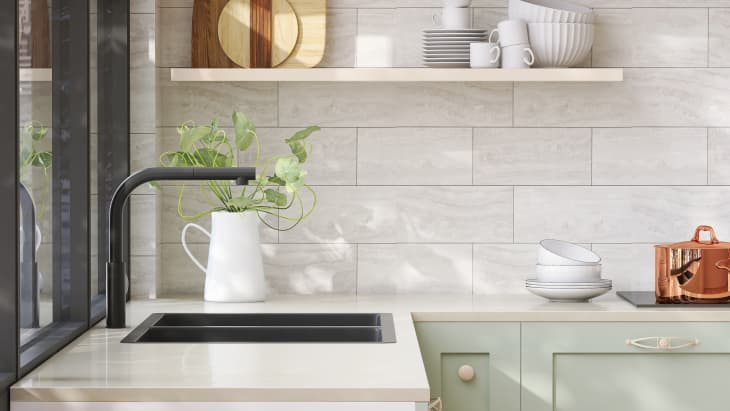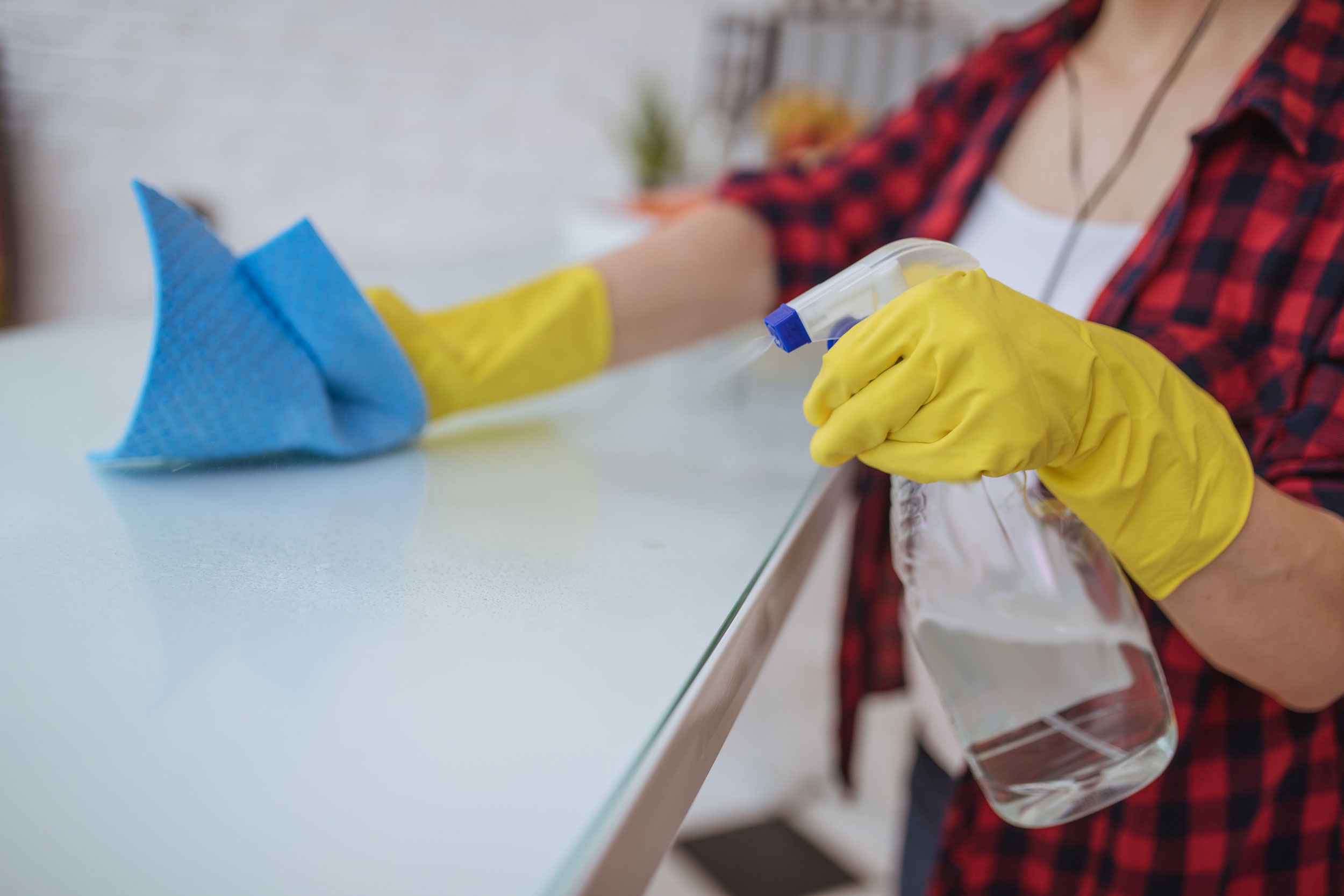Imagine walking into your kitchen and seeing countertops that sparkle with cleanliness and freshness. You deserve a kitchen that not only looks inviting but also feels safe and hygienic for you and your loved ones.
The secret to achieving this lies in a powerful, homemade kitchen counter cleaner that you can easily create yourself. Why spend money on expensive commercial cleaners filled with harsh chemicals when you can make an effective, eco-friendly alternative at home?
In this guide, you’ll discover step-by-step instructions to make your own kitchen counter cleaner using simple ingredients you probably already have in your pantry. Get ready to transform your cleaning routine with a solution that’s not only cost-effective but also kind to the environment. Let’s dive in and make your kitchen counters gleam!

Credit: www.apartmenttherapy.com
Benefits Of Homemade Cleaners
Homemade kitchen counter cleaners offer many benefits. They are simple to make and often inexpensive. You can choose ingredients that are safe for your family. Store-bought cleaners contain chemicals that may be harmful. Creating your own cleaner lets you control the components. This gives peace of mind knowing your kitchen is clean and safe.
Cost-effective Solution
Homemade cleaners save money over time. Many store-bought cleaners are pricey. Making your own uses basic ingredients found at home. Vinegar, baking soda, and essential oils are affordable. These items cost less than commercial products. You can create large batches for less money.
Environmentally Friendly
Using homemade cleaners benefits the environment. Store-bought cleaners often contain harsh chemicals. These chemicals can harm the planet. Natural ingredients are biodegradable. They do not pollute water systems. Homemade cleaners reduce waste and lessen your carbon footprint.
Customizable Scents
Homemade cleaners allow you to choose your scent. Many commercial cleaners have strong, artificial smells. You can add essential oils for a pleasant aroma. Lavender or lemon oil creates a fresh scent. Customize your cleaner to suit your preferences.
Safe For Families
Homemade cleaners are safer for children and pets. Store-bought products may have toxic chemicals. These chemicals can cause allergies or skin irritation. Using natural ingredients minimizes these risks. Your kitchen stays clean without harmful substances.
Effective Cleaning Power
Homemade cleaners work well on kitchen counters. Vinegar and baking soda have strong cleaning properties. They remove stains and grease effectively. These ingredients disinfect surfaces naturally. You can maintain a spotless kitchen with homemade solutions.

Credit: www.leshermarble.com
Essential Ingredients
Creating your own kitchen counter cleaner is simple. It requires a few essential ingredients. These ingredients are both effective and safe. They ensure your counters are spotless and fresh.
Natural Cleaning Agents
Natural cleaning agents are the backbone of homemade cleaners. Vinegar is a popular choice. It breaks down grime and kills bacteria. Baking soda is another useful ingredient. It tackles tough stains and neutralizes odors.
Safe Additives
Safe additives enhance cleaning power. Borax is a common option. It boosts the effectiveness of vinegar and baking soda. Hydrogen peroxide is also effective. It disinfects surfaces without harsh chemicals.
Essential Oils
Essential oils add fragrance and antimicrobial properties. Tea tree oil is a strong antibacterial agent. Lemon oil leaves a fresh scent and cuts grease. Lavender oil is calming and smells wonderful.
Tools And Equipment
Creating your own kitchen counter cleaner is not only economical but also environmentally friendly. To get started, you need the right tools and equipment. Having the proper gear ensures your cleaning solution is effective and easy to use. Let’s dive into what you’ll need!
Spray Bottles
Spray bottles are essential for any homemade cleaner. They allow you to evenly distribute the solution across your counters. Opt for a bottle with a fine mist setting for gentle application.
Consider using a recycled spray bottle from an old cleaning product. This not only saves money but also cuts down on plastic waste. Make sure it’s thoroughly cleaned before use!
Measuring Tools
Precision is key when mixing your cleaner. Measuring cups and spoons ensure you use the right amount of each ingredient. This balance is crucial for effectiveness.
Invest in a set of measuring tools that are easy to read. You’ll find them useful beyond just making cleaners—think of baking or cooking, too!
Mixing Containers
A sturdy mixing container helps you combine ingredients without spills. Choose a container with a lid to store any leftover cleaner for future use.
Glass jars are perfect for this task. They’re durable, easy to clean, and don’t react with acidic ingredients like vinegar. Plus, they add a touch of style to your DIY projects.
Have you ever thought about how the tools you use can impact the effectiveness of your homemade solutions? Every detail matters, from the type of spray bottle to the material of your mixing container. Give it a try—your counters will thank you!
Step-by-step Recipe
Discover a straightforward recipe to create an effective kitchen counter cleaner. Gather vinegar, water, and essential oil for freshness. Mix in a spray bottle, and enjoy a cleaner kitchen with natural ingredients.
Creating your own kitchen counter cleaner is not only budget-friendly, but also ensures you know exactly what ingredients are in your cleaner. It’s a simple process that can turn into a fun DIY project. Follow this step-by-step recipe to make a cleaner that will leave your kitchen sparkling and smelling fresh.Measuring Ingredients
Start by gathering your ingredients: white vinegar, water, and a few drops of essential oil if you like a scented cleaner. Measure one cup of white vinegar and one cup of water. Using equal parts ensures a balanced solution that’s effective yet gentle on surfaces.Mixing Process
Pour the measured vinegar and water into a spray bottle. Add 10-15 drops of essential oil for fragrance—lavender or lemon are excellent choices. Shake the bottle gently to mix everything together. Have you ever noticed how the right scent can uplift your mood?Storage Tips
Store the cleaner in a cool, dark place to preserve its effectiveness. Make sure the spray bottle is tightly sealed to prevent leaks. Use a label to mark the bottle with the date you made the cleaner. This way, you can track its freshness. Why buy expensive commercial cleaners when you can make your own? This DIY cleaner is not only effective but also customizable to your scent preference. Have you tried making your own cleaning products before? It’s a small change with a big impact on your cleaning routine.Application Techniques
Mix vinegar and water in a spray bottle for an effective kitchen counter cleaner. Add a few drops of essential oil for a pleasant scent. Spray the solution on counters, then wipe with a clean cloth for a sparkling finish.
Cleaning your kitchen counter effectively is more than just having the right cleaner; it’s about mastering the application techniques. Knowing how to properly prepare and treat your surfaces can make a huge difference. Let’s dive into some practical steps that will ensure your counters are not only spotless but also well-maintained.Surface Preparation
Before applying any cleaner, ensure your counters are free of large debris. Use a soft cloth or a brush to sweep away crumbs and dirt. This step prevents scratching and ensures the cleaner can do its job effectively. Identify the type of material your counter is made from. Different materials like granite, laminate, or wood require specific care. This knowledge helps you choose the appropriate cleaning solution and method. You might wonder why this matters. Using the wrong cleaner can damage your counter’s surface. Always test a small area if you’re using a new cleaner for the first time.Application Methods
Once your surface is prepped, it’s time to apply the cleaner. Spray or pour a small amount directly onto the counter. Use a clean cloth or sponge to spread it evenly across the surface. Don’t over-saturate the surface. Excess liquid can seep into seams or edges, potentially causing damage. A little goes a long way in achieving a streak-free shine. For stubborn stains or sticky spots, let the cleaner sit for a few minutes before wiping. This gives it time to break down grime, making your job easier.Rinsing And Drying
After applying and wiping, rinse the surface with a damp cloth to remove any residue. This step is crucial to prevent streaks and ensure a clean finish. Use a dry, absorbent towel to wipe the counter dry. This not only prevents water spots but also gives the surface a polished look. Consider this: leaving your counter wet can lead to water stains or even mold in certain materials. Drying is just as important as the cleaning itself. Have you ever noticed a film or streaks on your counters after cleaning? This often happens if rinsing and drying are skipped. Taking these extra steps will keep your counters looking their best. Incorporating these straightforward techniques into your cleaning routine can transform your kitchen space. Have you tried any of these methods, or do you have tips that work wonders for your counters? Share your experiences!Safety Precautions
Creating a kitchen counter cleaner requires careful handling of ingredients to ensure safety. Use gloves to protect skin from harsh chemicals. Ensure proper ventilation by opening windows or turning on fans during the cleaning process.
Creating your own kitchen counter cleaner can be both rewarding and cost-effective. However, ensuring safety during the process is crucial. As you embark on this DIY journey, it’s essential to understand the precautions you need to take to protect yourself and your surroundings. Let’s delve into the specifics with some practical advice.Handling Ingredients
When mixing ingredients for your cleaner, precision matters. Measure each component carefully to avoid any unwanted reactions. Trust me, once I accidentally mixed bleach with vinegar, and let’s just say my eyes were watering for days! Avoid using ingredients that you are unfamiliar with. If you’re new to a particular chemical, take the time to research its properties. This ensures you’re not caught off guard by any surprises.Protective Gear
Have you ever thought about the importance of protective gear while making cleaners? You may not think you need it, but gloves and goggles can prevent irritations and accidents. It’s better to be safe than sorry. Consider wearing long sleeves to protect your skin from splashes. A simple apron can also save your clothes from stains, ensuring your favorite t-shirt remains spotless.Storage Safety
Storage is a vital aspect of safety that often goes overlooked. When your cleaner is ready, store it in a clearly labeled container. This prevents any mix-ups with other household items. Ensure the container is tightly sealed to avoid spills. You wouldn’t want your curious toddler or pet knocking it over, would you? Think about where you’ll store the cleaner. Keep it away from heat sources and direct sunlight to maintain its effectiveness. A cool, dark cupboard works perfectly. By focusing on these safety precautions, you’re not just creating a cleaner; you’re ensuring a safe environment for everyone in your household. What additional safety measures do you think are essential when making DIY cleaners?Customizing Your Cleaner
Creating your own kitchen counter cleaner gives you control over what goes into your cleaning solution. It allows you to cater it to your needs and preferences, ensuring a pleasant cleaning experience. Customizing your cleaner can enhance its functionality and make cleaning less of a chore. Let’s dive into how you can personalize your cleaner to suit your lifestyle.
Scent Variations
Do you love the refreshing scent of citrus or the calming aroma of lavender? Adding essential oils to your cleaner can transform your cleaning routine. Consider using lemon or orange oil for a zesty scent that invigorates your kitchen space. Or perhaps opt for lavender or eucalyptus for a more relaxing vibe. Essential oils not only provide fragrance but also offer additional cleaning properties.
Strength Adjustments
Sometimes, your counter might need a more potent solution. If you’ve dealt with stubborn stains or grease, you know what I mean. Adjusting the strength of your cleaner can tackle tougher messes. Try increasing the vinegar concentration or adding a bit more baking soda for extra scrubbing power. Remember, a little tweak can make a big difference in effectiveness.
Specialized Uses
Did you know that your customized cleaner can have specialized uses? Imagine a cleaner that not only shines your counters but also sanitizes your cutting boards. By adding a few drops of tea tree oil, you can enhance the antibacterial properties of your solution. Consider adding a splash of alcohol for extra disinfecting power, especially after preparing raw foods. Tailor your cleaner to serve multiple purposes in your kitchen.
What customization will you try today? Share your experiences and see how these adjustments can make cleaning a breeze!
Common Mistakes
Creating your own kitchen counter cleaner is a great choice. It saves money and reduces chemicals in your home. Yet, many people make mistakes during this process. These mistakes can reduce the cleaner’s effectiveness or even damage surfaces. Knowing common errors helps avoid them and keep counters shiny and safe.
Ingredient Imbalances
Using the wrong mix of ingredients is a frequent issue. Too much vinegar or baking soda can harm certain surfaces. This imbalance may lead to ineffective cleaning or surface damage. Always follow the recipe closely and measure each component carefully. The right balance ensures your cleaner works effectively.
Improper Storage
Storing homemade cleaner incorrectly affects its shelf life. Avoid using containers that allow light to pass through. Light can degrade some ingredients, making the cleaner less effective. Store your cleaner in a dark, cool place. This keeps it fresh and ready for use.
Overuse And Surface Damage
Using too much cleaner can cause harm. Overuse may leave residue, attracting dirt and bacteria. Some surfaces, like granite or marble, can get damaged with excessive use. Always use a small amount and test on a hidden area first. This ensures the cleaner is safe for your counters.
Environmental Impact
Creating a kitchen counter cleaner can reduce environmental impact. Mix vinegar and water for a natural solution. Essential oils add fragrance and boost cleaning power.
Cleaning your kitchen can be more than just a chore; it’s an opportunity to make a positive impact on the environment. Have you ever considered the environmental footprint of your cleaning products? Many commercial cleaners contain harsh chemicals that can harm the planet. Making your own kitchen counter cleaner not only saves money but also helps reduce your environmental impact.Eco-friendly Ingredients
Using natural ingredients is a game-changer. Vinegar, baking soda, and lemon are excellent for cleaning and are safe for the environment. These ingredients break down naturally, causing no harm to water systems or wildlife. Essential oils like tea tree or lavender can add a pleasant scent. They also have antibacterial properties. So, you get a fresh-smelling kitchen without synthetic fragrances.Reducing Waste
Think about how much plastic waste comes from store-bought cleaners. By making your own, you can reuse a single spray bottle for years. This significantly reduces plastic waste in landfills. Consider buying ingredients in bulk to cut down on packaging waste. When you reduce waste, you contribute to a cleaner planet. Isn’t that a rewarding thought?Sustainable Practices
Making your own cleaner can be a fun family activity. It’s a practical way to teach kids about sustainability. Plus, you’re setting a positive example for them to follow. You can also share your homemade cleaner with friends and family. Encourage them to adopt sustainable practices too. Imagine the collective impact if everyone made this small change. Choosing to make your own kitchen counter cleaner is a simple yet powerful step toward environmental responsibility. What small changes can you make today for a greener tomorrow?
Credit: extension.sdstate.edu
Frequently Asked Questions
What Ingredients Are Best For Kitchen Counter Cleaner?
Natural ingredients like vinegar, baking soda, and lemon are effective for cleaning. They cut through grease and grime easily. These ingredients are eco-friendly and affordable. They also help maintain the shine of your kitchen counters. Always test a small area before use to ensure compatibility.
How Often Should I Clean Kitchen Counters?
Clean counters daily to prevent buildup of bacteria and stains. Regular cleaning maintains a hygienic kitchen environment. Quick daily wipe-downs can prevent long-term damage. For deep cleaning, aim for once a week. Consistent cleaning keeps your counters looking fresh and inviting.
Can Homemade Cleaners Remove Tough Stains?
Yes, homemade cleaners can tackle tough stains effectively. Use vinegar and baking soda for stubborn spots. Lemon juice is excellent for brightening and deodorizing surfaces. Let the cleaner sit for a few minutes on tough stains. Scrub gently with a soft cloth for best results.
Is Vinegar Safe For All Countertop Materials?
Vinegar is safe for most countertops but not all. Avoid using vinegar on granite or marble surfaces. It can damage the finish and cause etching. For these surfaces, use mild soap and water. Always check manufacturer guidelines for cleaning recommendations.
Conclusion
Creating your own kitchen counter cleaner is simple. Easy steps make it quick. You control the ingredients. Ensure safety for your family. Keep costs low. Protect the environment with natural choices. Enjoy a clean kitchen without harsh chemicals. Feel proud of your homemade cleaner.
It works well for everyday cleaning needs. Share the recipe with friends. Encourage them to try it too. Clean counters make cooking more pleasant. Happy cleaning leads to happy cooking. Now, you’re ready to keep your kitchen sparkling. Enjoy a fresh, clean space.

As the chief content writer, Hassan Al Sarker works as a professional kitchen-based content creator at Kitchen Liker.
In addition to reviewing the content published on Kitchen Liker, he ensures that it is accurate, relevant, and helpful. As a result, all the reviews and information published at Kitchen Liker are neutral and userfriendly.
Hassan Al Sarker has a bachelor’s degree in Hotel and Tourism Management From the Newyork University. Before joining Kitchen Liker, he was a contributor at Kitchen Club, United States.
